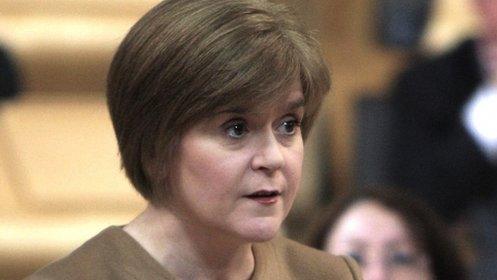Turning up the heat
- Published

Maternity payments will be capped under the plan
There's aye a somethin'. Or, to put it another way, the best laid plans of hominids and rodents frequently result in unforeseen outcomes.
I mean, take Scottish football. This winter break for the SPL must have seemed like a wizard wheeze when it was first proposed.
Do you recall the outcry last year when the SPL struggled on during the winter, braving the blast o' Janwar win' which assailed players and fans alike? All - or most - were agreed. A winter break there must be. The cry went up: C'mon, SPL, get real.
Come 2013 - and the winter break begins. The result? Temperatures soar to a relatively balmy 11 or 12 degrees Celsius. In parts of Scotland, it resembles midsummer - or at least the weather we have now come to expect in July.
In the capital, it has been so unseasonably warm that the outdoor ice rink melted. (It has now apparently reopened - huzzah! - although I confess that I do not speak from personal experience.)
Had the football matches been held, the players would have had to wear light kit to prevent over-heating. The fans would have been sporting T-shirts with mildly amusing logos.
You see what I mean? Who could have foreseen this eventuality? (Apart, that is, from the Met Office and a few enthusiastic amateurs holding their fingers up to the prevailing wind.)
Ditto politics. Diverse aspects frequently emerge to add new dimensions to the intended political debate. Discourse is often more nuanced than first appears. Shedding the drollery, this would appear to be potentially true with regard to the developing controversy over welfare.
Self-evidently, this is primarily an issue involving provision, cost and fairness. How best to target help upon the genuinely needy without over-burdening the charge upon the public purse.
But, as the debate in the Commons today indicates, there is also partisan politics in play. There is - some - tension within the UK coalition between those who are, variously, eager for and disquieted by the proposed cap on certain benefits.
There is evident and contrived tension between the UK government and the Labour opposition. Ministers, especially those in Tory colours, will seek to portray their opponents as backing the skivers over the strivers, to borrow the current demotic.
Their Labour opponents will seek to turn this on its head, arguing that the benefits curb will include within its scope those who are working but on low incomes, requiring support.
Scottish instinct
In Scotland there is a further dimension, outlined to the Scottish Cabinet today by the deputy First Minister Nicola Sturgeon.
She spelled out the potential impact upon Scots families, listed elsewhere on these pages. She invited further suggestions as to ways in which the Scottish government might seek to mitigate that impact.
But then a stage further. Ms Sturgeon referred to the commission she has established which is tasked with outlining ways in which welfare provision might be directed and resourced in an independent Scotland.
Not, to be clear, precise details at this stage of SNP welfare policy. Rather, in keeping with emerging thinking, an outline of the capacity for policy change which independence might involve.
Depicting a sense of empowerment. Suggesting, at the very minimum, that Scotland's approach would diverge from that currently being pursued by the UK government and parliament.
Which, of itself, creates an additional facet to the welfare debate. Unionists - including Labour - will argue that welfare provision is more effective across the broader polity of the UK because of the greater scope for equalisation and sharing.
Nationalists will say that the welfare changes being introduced at Westminster lie counter to Scottish instinct - and argue for independence.
Have a guid New Year. Try not to overheat.
- Published8 January 2013
